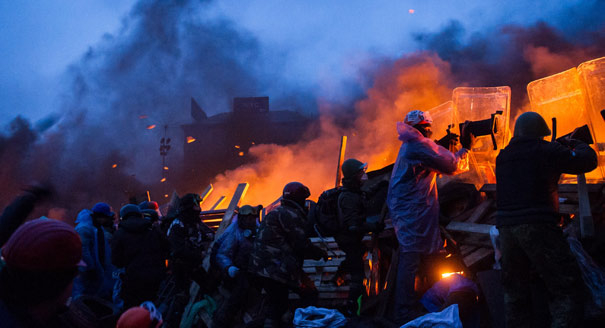One can only be humbled in admiration at the actions of Ukraine’s antigovernment protesters. And one can only hope they do not replicate other countries’ failures to convert the ethos of revolution into good-quality democracy.
For outside actors, simply advocating “help” for Ukraine is too unspecific. The EU’s challenge is more complicated than offering money and closer partnership. And it goes beyond neutralizing any spoiling tactics by Russia. Rather, the question is how to tailor external policies to the intricate political dynamics in Ukraine that will determine the quality of the country’s transition.
There is widespread agreement that reform must be inclusive and that Ukraine needs new leaders. But what does this mean in practice?
Ukraine’s denouement on February 21 shared notable similarities with Egypt’s 2011 revolution. An authoritarian leader was driven from power by popular protest. Demonstrations that were originally not about regime change but about more specific and less ambitious demands took on a different scope in response to regime brutality.
Egypt should serve as a reminder to Ukrainians that it is one thing to dislodge a leader, quite another to construct a democratic regime. The spirit that pushes dictators out of the door is not always the same force that is most suited to the challenges that come after the high drama of regime change.Good new democratic leaders do not simply appear on the spot. A common pattern is for new “democrats” to rise to power after playing a prominent role in regime removals only for their own leadership to prove less than spotlessly democratic.
Ukraine paid a price for placing so much faith in the leaders of the 2004–2005 Orange Revolution. Most observers now recognize that it would be inadvisable to simply substitute ousted president Viktor Yanukovych with the ilk of former prime minister Yulia Tymoshenko. But reformers must also resist relying on the current revolution to produce a new wave of charismatic figureheads.
Rather, inclusive institutional processes are required to produce leaders with more firmly embedded democratic norms. External actors must avoid favoring certain opposition politicians. Good democratic leaders are more likely to emerge when the parties that produce them are also strongly institutionalized.
A decade on from the Orange Revolution, Ukraine’s political parties are nowhere near meeting the requisite criteria. Ukraine needs assistance to build parties that have better programmatic platforms and are built on coherent, substantive ideologies, not individual personalities.
As part of a deal brokered to end the recent unrest, Ukraine’s next presidential election will be brought forward from next year to this. That will raise challenges if the country is not to repeat another of Egypt’s mistakes. In Ukraine, the timing of the presidential poll will favor established figures and militate against the new leadership that the country needs.
Ukraine’s leaders also agreed to restore the 2004 constitution, which established a parliamentary rather than a presidential system. That bodes well for inclusive transition. But a truly democratic parliament requires more than a simple change of personnel. Ukraine’s legislature cannot rescue the country without major changes to its parliamentary culture—a process that is rarely quick. More professionalized parliamentary procedures should be supported in way that was not done after 2004.
Ukraine should also be careful not to rush forward unless all parts of the country are involved in its transition and rights for minorities are strengthened, including through a replacement language law. Ukraine should look to Tunisia for a consensus-building model and to Egypt as the tragedy to avoid. Many in Ukraine acknowledge that inclusiveness must be based on a relatively decentralized political system. The lesson from other transitions is that such decentralization needs to complement, not substitute, a strongly institutionalized culture of pluralism.
In many ways, Ukraine should be better placed than Egypt after the ouster of former president Hosni Mubarak. Ukraine’s institutional structures already have some degree of pluralism, and Ukrainians are acutely aware of the way that the gains of the Orange Revolution were squandered. In effect, they have the advantage of a second bite at the transition cherry.
However, in some ways, the challenges may be more difficult for Ukraine. The process of state formation is not yet fully complete—as recent events in Crimea demonstrate—and that invariably complicates the transition to democracy. The process of state formation requires as much focus on reshaping identities as on formal institutional procedures.
In addition, while generous macroeconomic assistance is needed to pull Ukraine’s economy back from the precipice, such assistance is not the same thing as helping democracy. Experience suggests that even when aid is tied to economic liberalization, it can work in ways not necessarily beneficial to deepening democracy. Civil society should be given a role in monitoring economic assistance.
While EU diplomacy did play a role in the demise of the regime, the EU’s template was based on an elite-led, negotiated exit to the crisis, involving Yanukovych as president. That approach unquestionably left the EU out of sync with most of Ukrainian civil society. Ultimately, Yanukovych fled almost despite the West, not because of it.
In this, there is a broader lesson that Western policymakers remain reluctant to take on board. Diplomats were similarly behind the curve in 2011, when they tried to convince Mubarak to implement sufficient concessions to save his regime.
Policymakers hardly need to be reminded of their options for helping Ukraine. But they do need to be guided by more nuanced deliberation of the balances to be struck in any successful transition. Rather than resting on the laurels of presumed success, the EU must make an uphill climb to rebuild its reputation in Ukraine.
The EU will not achieve that if it adheres to an overly elitist approach to the post-Yanukovych context. Support for inclusive reform is a European tendency that often morphs into such elitism. In its new assistance to Ukraine, the EU must not let the balance tip too far in this direction.






